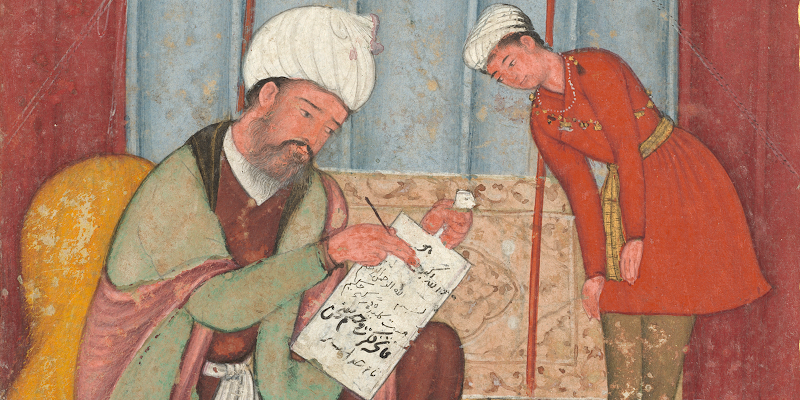Experimenting with Plague in 18th Century Egypt
with Edna Bonhomme
hosted by Chris Gratien
Podcast Feed | iTunes | Hipcast | Soundcloud
As research on the early modern period increasingly shows, bubonic plague played a formative role in the making of state policies and medical practice, and concern over plague created new connections between different regions of the Mediterranean. In this episode, Edna Bonhomme joins us again to talk about her research on plague in North Africa, its relationship with the issue of the global slave trade, and the ways in which experimenting with plague became a practice among Europeans residing in 18th-century Egypt.
Stream via Soundcloud (US / preferred)
Stream via Hipcast (Turkey / Türkiye)
PARTICIPANTS
 |
Edna Bonhomme is a doctoral candidate in History of Science at Princeton University. Her dissertation focuses on the history of the bubonic plague in Cairo and Tunis during the outbreaks in the 1780s and 1790s. She graduated from Reed College in 2006 with a degree in Biology and from Columbia University with a master's in public health. Prior to pursuing history, she was a research assistant at the Oregon Health and Sciences University. In addition to academic work, she occasionally writes for Socialist Worker and Red Wedge Magazine.
|
 |
Chris Gratien holds a Ph.D. from Georgetown University's Department of History. His research focuses on the social and environmental history of the Ottoman Empire and the modern Middle East. He is currently preparing a monograph about the environmental history of the Cilicia region from the 1850s until the 1950s. |
CREDITS
Episode No. 225
Release Date: 20 February 2016
Recording Location: Manhattan, NY
Editing and production by Chris Gratien
Special thanks to Kara Güneş for allowing us to use the composition "Istanbul" in the intro and outro music
Sound excerpts: Harmandali - Recep Efendi, Cemal Efendi; Istanbul'dan Ayva Gelir Nar Gelir - Azize Tozem and Sari Recep.
Additional thanks to Susanna Ferguson
Image via Library of Congress
Bibliography courtesy of Edna Bonhomme
SELECT BIBLIOGRAPHY
Abul-Magd, Zeinab. Imagined Empires: A History of Revolt in Egypt. Berkeley: University of California Press, 2013.
Antes, John. Observations on the Manners and Customs of the Egyptians, the Overflowing of the Nile and Its Effects; with Remarks on the Plague, and Other Subjects. London: Printed for J. Stockdale, 1800.
Baldwin, George. Political Recollections Relative to Egypt: Containing Observations on Its Government under the Mamlucks; Its Geographical Position; Its Intrinsic and Extrinsic Resources; Its Relative Importance to England and France; and Its Dangers to England in the Possession of France: With a Narrative of the Ever-Memorable British Campaign in the Spring of 1801. London: W. Bulmer & Co., 1802.
Barry, Jonathan, and Kenneth Morgan. The Moravians in Revival and Reformation in 18th-century Bristol. Bristol: Bristol Record Society, 1994.
Behrens-Abouseif, Doris. Islamic Architecture in Cairo: An Introduction. Leiden: E.J. Brill, 1989.
Bulmus, Birsen. Plague, Quarantines and Geopolitics in the Ottoman Empire. Edinburgh: Edinburgh University Press, 2012.
Camus, Albert. The Plague. Translated by Stuart Gilbert. New York: A.A. Knopf, 1948.
Cohn, Samuel Kline. Cultures of Plague: Medical Thinking at the End of the Renaissance. Oxford: Oxford University Press, 2010.
Cook, Harold John. Matters of Exchange: Commerce, Medicine, and Science in the Dutch Golden Age. New Haven: Yale University Press, 2007.
Damodaran, Vinita, Anna Winterbottom, and Alan Lester. The East India Company and the Natural World. London: Palgrave, 2015.
Dols, Michael. The Black Death in the Middle East. Princeton: Princeton University Press, 1977.
Gallagher, Nancy Elizabeth. Egypt's Other Wars: Epidemics and the Politics of Public Health. Syracuse: Syracuse University Press, 1990.
Garcia-Ballester, Luis. Practical Medicine from Salerno to the Black Death. Cambridge: Cambridge University Press, 1994.
Fahmy, Khaled. All the Pasha's Men: Mehmed Ali, His Army, and the Making of Modern Egypt. Cambridge: Cambridge University Press, 1997.
Hanna, Nelly. In Praise of Books : A Cultural History of Cairo's Middle Class, Sixteenth to the Eighteenth Century. Syracuse, N.Y.: Syracuse University Press, 2003.
Jabartī, ʻAbd al-Raḥmān. ʻajāʼib Al-Āthār Fī Al-Tarājim Wa-Al-Akhbār. Cairo: Lajnat al-Bayān al-ʻArabī, 1958. Microform.
Kuhnke, LaVerne. Lives at Risk: Public Health in Nineteenth-Century Egypt. Berkeley: University of California Press, 1990.
Latour, Bruno, and Steve Woolgar. Laboratory Life: The Construction of Scientific Facts. Princeton, N.J.: Princeton University Press, 1986.
McNeill, William H. Plagues and Peoples. New York: Anchor Books, 1998 [1977].
Newman, William R. Alchemy Tried in the Fire: Starkey, Boyle, and the Fate of Helmontian Chymistry. Chicago: University of Chicago Press, 2002.
Palladino, Paolo, and Michael Worboys. "Science and Imperialism." Isis 84: 1 (1993): 91-102.
Pickstone, John V. Ways of Knowing: A New History of Science, Technology and Medicine. Manchester: Manchester University Press, 2000.
Saliba, George. Islamic Science and the Making of the European Renaissance. Cambridge: MIT Press, 2007
Shefer-Mossensohn, Miri. Ottoman Medicine: Healing and Medical Institutions, 1500-1700. Albany: SUNY Press, 2009.
Spillane, John David. Medical Travellers: Narratives from the Seventeenth, Eighteenth, and Nineteenth Centuries. Oxford Medical Publications. Oxford: Oxford University Press, 1984.
Stearns, Justin K. Infectious Ideas: Contagion in Premodern Islamic and Christian Thought in the Western Mediterranean. Baltimore: Johns Hopkins University Press, 2011.
Temkin, Owsei. The Double Face of Janus and Other Essays in the History of Medicine. Baltimore: John Hopkins University Press, 1977.
Varlik, Nükhet. Plague and Empire in the Early Modern Mediterranean World: The Ottoman Experience, 1347-1600. 2015.










Comments
Post a Comment
Due to an overwhelming amount of spam, we no longer read comments submitted to the blog.